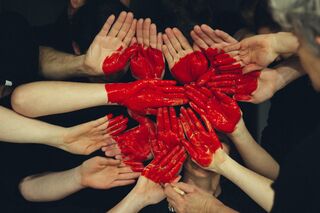Grief
Connecting Through Grief
We all need creative ways to process grief and deal with loss—especially now.
Posted December 15, 2020

When I was 22 years old, I taught in a high school about 30 minutes from Providence, Rhode Island. The area was pretty rural then and isolated—many of the students told me they’d never even been to Providence.
I taught English and, in those days, teachers had the freedom to choose their materials and methods. I brought in ballads, folk music, and rock & roll; we learned logic together; we read MAD magazine and made our own versions of it. My students really appreciated my creativity and my urging them to be creative. Even so, I envied the art teachers because being creative and fostering creativity was what they were supposed to do. I thought they had all the fun.
I didn’t become an art teacher or even remain a high school English teacher. Instead, I went to graduate school in linguistics and developmental psychology. You see, I loved language—the art of it, the creativity of it, and the effortless way we learn it as babies. And through my study and research, I discovered that playing, improvising, and performing are the secrets to learning language—indeed to learning anything. Looking back, I realized that in my high school classes, what I was doing was helping teenagers become language artists by giving them opportunities to play with words, to improvise with each other, and to perform as wordsmiths—just like they did when they were little.
It’s hard to play these days. We’ve been socialized to “stop playing and get to work” if we want to succeed in school and in life. It saddens me how rarely children get to play in school and how few families play at home. But it’s not only kids that suffer the loss of play. We all do. Teachers suffer. Parents suffer. Workers suffer.
All of my adult life has been about bringing play, improvisation, and performance back into people’s lives, whatever their age or situation. I want to help people reinitiate their creativity, their curiosity, their desire to learn, their development, their capacity to hope and generate joy. I say reinitiate because, for so many of us, the fire has gone out. But the embers are still smoldering—we all have these capacities and they’re just waiting to be reignited.
Amazingly, the pandemic—the very thing keeping people physically isolated and scared and upset, is actually fanning these embers. People may not be touching each other physically, but through virtual technology like Zoom and WhatsApp, they are touching each other emotionally, awakening their creativity, bringing joy to their lives, and generating hope. They are experiencing first-hand how play can build connection and add new dimensions to our relationships (not only with our loved ones, but also with strangers). They are literally broadening and changing how they’re feeling about themselves and others.
Here is one example out of the hundreds that I’m personally aware of. It tells of a workshop session, a free offering of the Global Play Brigade (more about this amazing organization later) led by improvisor, clown, and group builder Marian Rich. For this particular session, mental health advocate and host of the podcast Playgrounding Kara Fortier was Marian’s co-facilitator. Marian’s father had recently died, and with this loss and Kara’s interests in ritual and spirituality, they decided to design a session playing with loss, both large and small.
They wrote about it after. Here are some excerpts.
All of our lives have been affected in some way by the events of 2020 – COVID, lockdowns, protests, political turmoil and climate crises. In our session, we acknowledged the losses we’ve all been experiencing, from the crushing kinds to the smaller losses we experience that often hit us with unexpected force.
We designed a session to play with processing loss and grief through ritual, which is a close cousin of imaginative play. We began the session with having people write how they experience loss in the chat. Some of their comments: “sadness at the loss of the future I was expecting,” “losing touch with friends,” “can’t visit my young adult kids,” “aging/loss of flexibility,” “loss of hope and the shocking realization (again) that I’m not in control.”
We began by playing with and imbuing ordinary objects with extraordinary value in the “Museum of Everyday Objects” where participants simultaneously grab an object and showcase it as though they are the artists who created these “works of art,” with classical music playing behind them. Then we played with our objects in ways they weren’t meant to be used. They playfully laid the groundwork for what it means to create a ritual. Then people went into breakout groups to create a ritual that represented either one person’s loss or encompassed the loss of the whole group.
It’s hard to describe the experience of watching each group perform rituals they collaboratively created. In every instance, the human need to imaginatively share grief with one another stood out beautifully. One person holds an object with great care as the others follow her lead — only they don’t have objects in their hands. They’re participating in her ritual even though it’s not their pain. In another, the group held their objects and recited a line of their collective poem — the grief of each part became a whole. In another, they all let out cheers of joy.
The instinct to play is the same instinct that leads us to these creative ways to process grief, large and small. It was an honor for us to play in a way that reminds us of our deep human connections — and that our playful imaginations can aid us in times of sadness, sorrow, and joy.
Marian and Kara are two of hundreds of free play session facilitators of the Global Play Brigade (GPB). The all-volunteer organization formed in response to the global pandemic. Founded by artists, performers, therapists, and educators who are part of the social movement of performance activism, they “believe that integrating and utilizing play, impro, clown, theater and therapeutics into everyday life is a vital methodology for creating hope, possibility, emotional well-being and development. This current human crisis is unleashing a surge of human creativity and connection that has always been there but was hidden or suppressed — and now, out of necessity, it’s seeing the light of day in beautiful expressions across the globe.”
The GPB offers free workshops each week for people of any age, in English and several other languages (including gibberish!). Here’s a sampling of what's coming up in December and January— Celebrating Spirituality; Playful Conversation/Playful Listening; Emotional Support Space; Let’s Greet 2021 with Laughter. You can sign up here—for any and all! I sincerely hope that you do. I think it will warm your heart and soul.




